Abstract
Unresponsiveness to delayed type hypersensitivity was induced in mice following an intravenous injection of herpes simplex virus. The principal tolerogens used were thymidine kinase-deficient virus mutants which grow poorly in vivo; u.v.-inactivated and to a lesser extent formalin-inactivated virus were also tolerogenic. The tolerance induced was specific for the virus type. Despite the tolerance to delayed hypersensitivity, anti-viral immunity is present as determined by the rapid inactivation of infectious virus. The mechanism of tolerance to herpes virus and the importance of these observations for the pathogenesis of viral disease is discussed.
Full text
PDF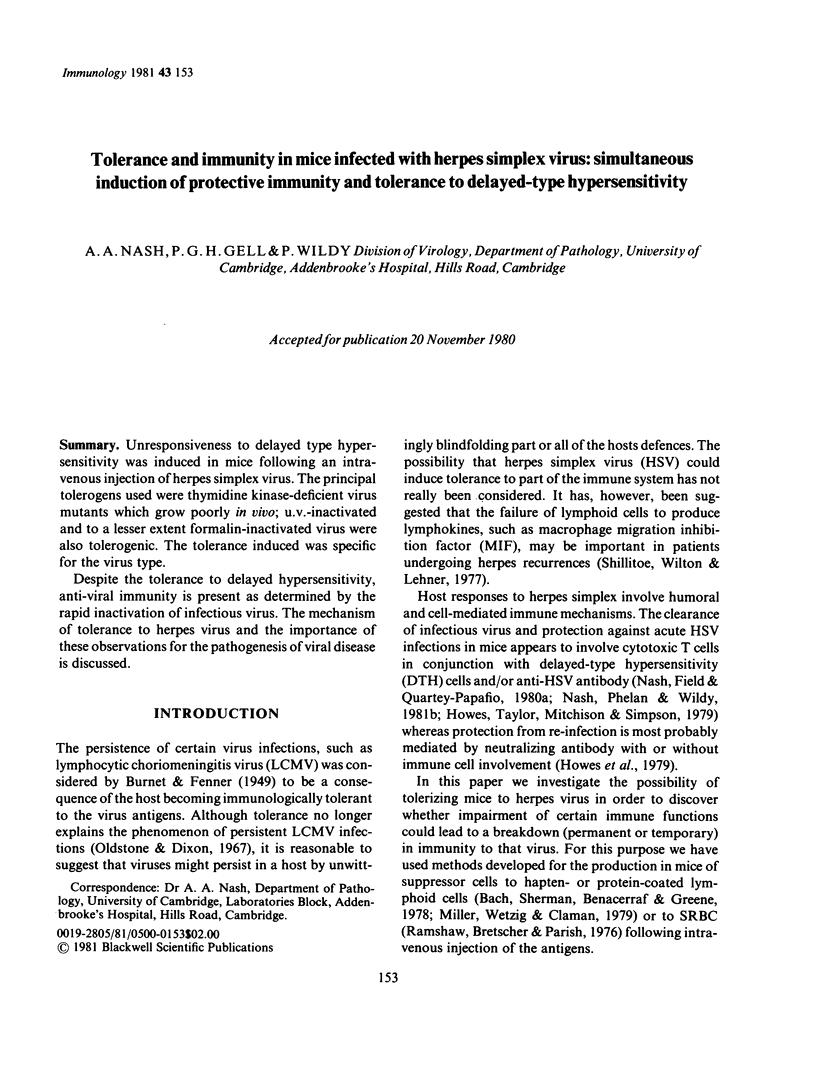
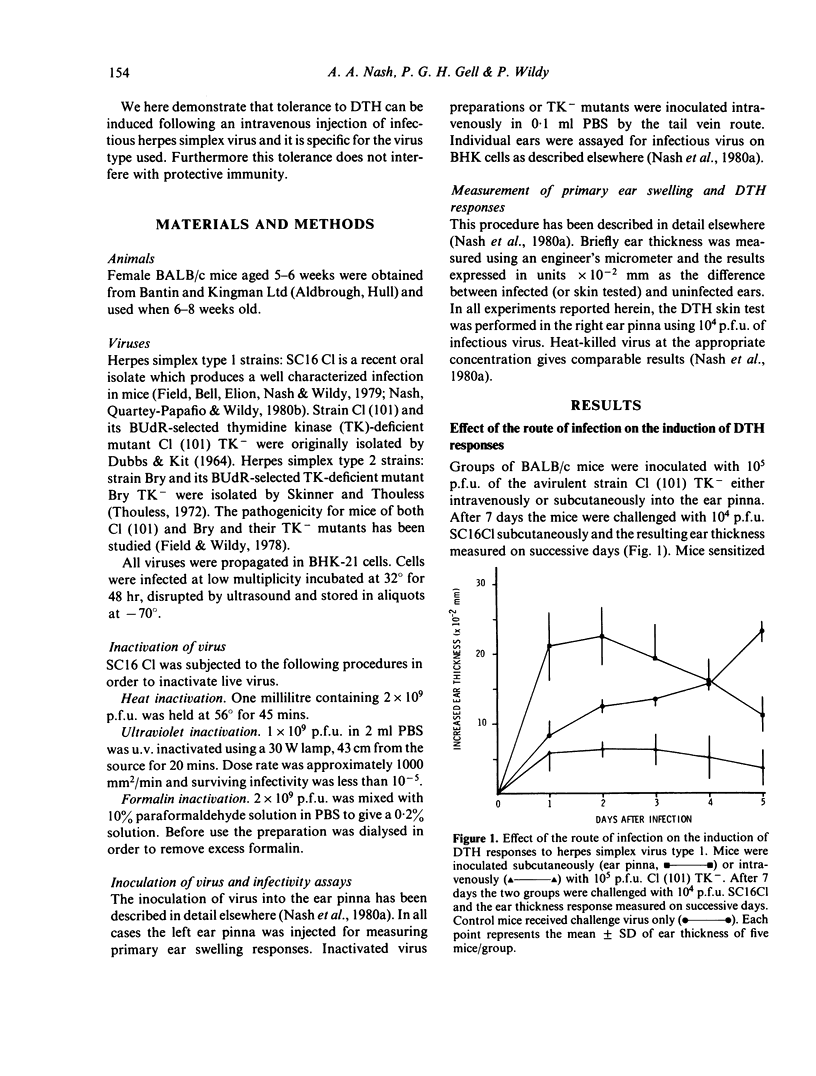
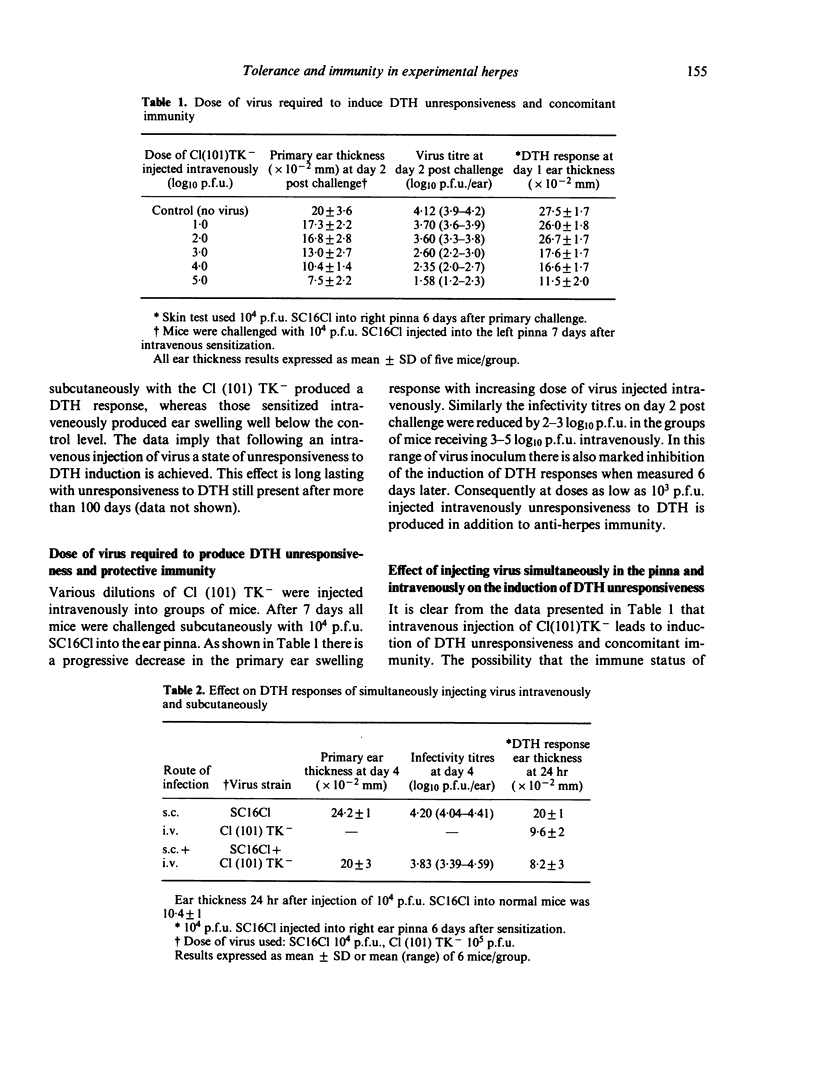
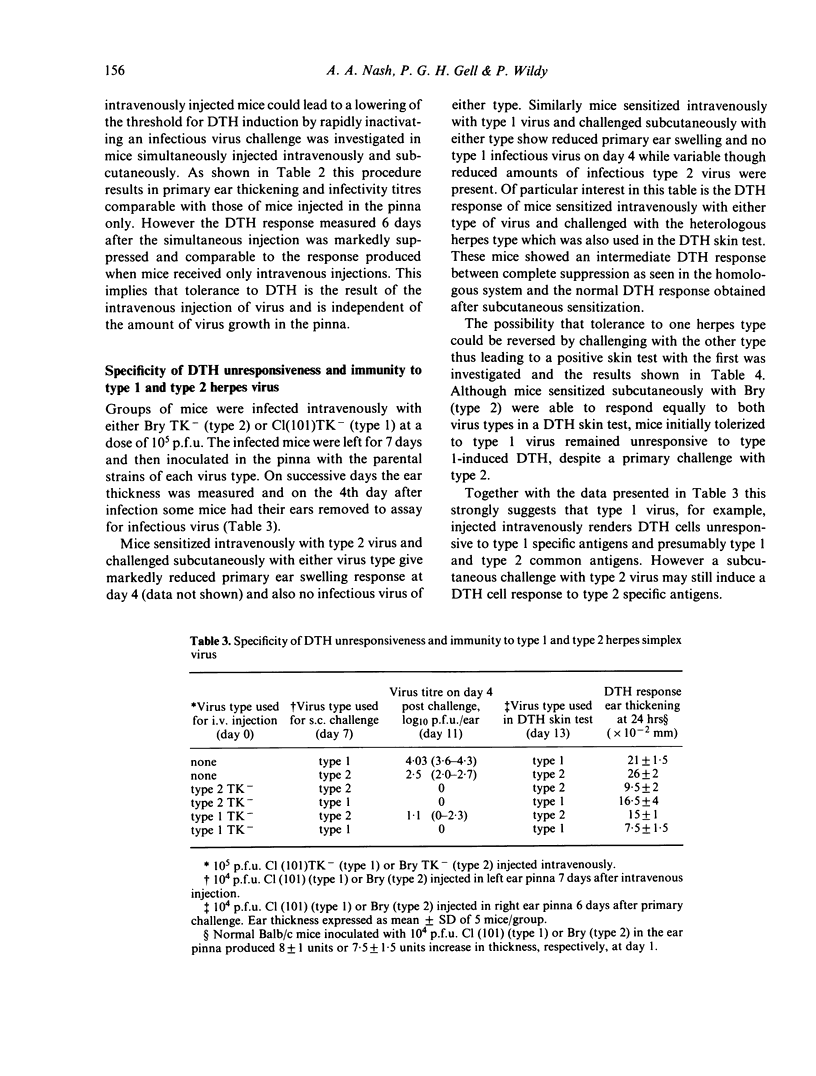
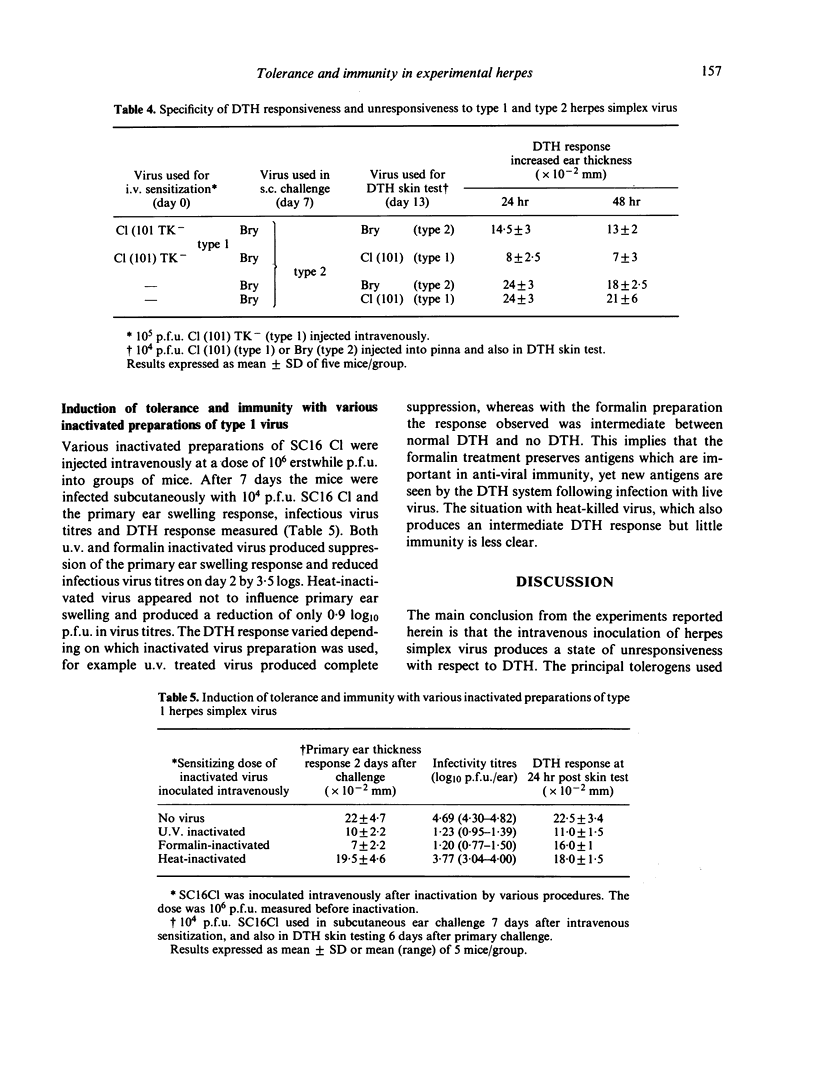
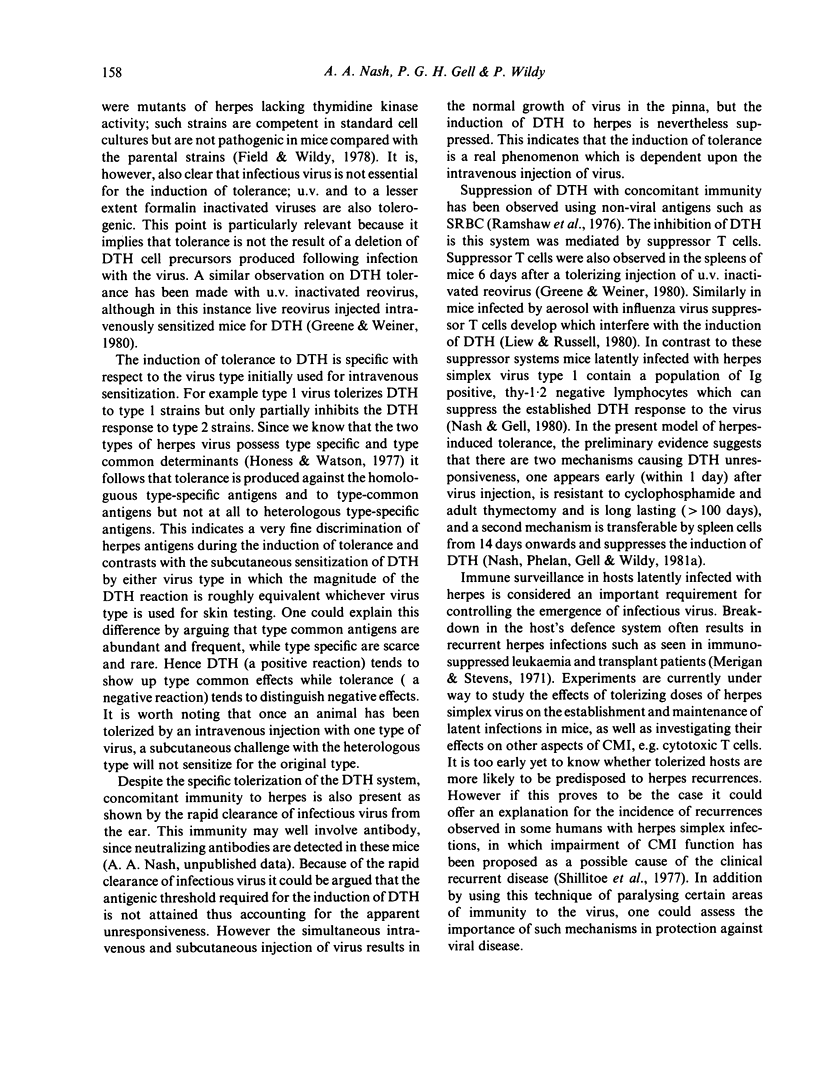
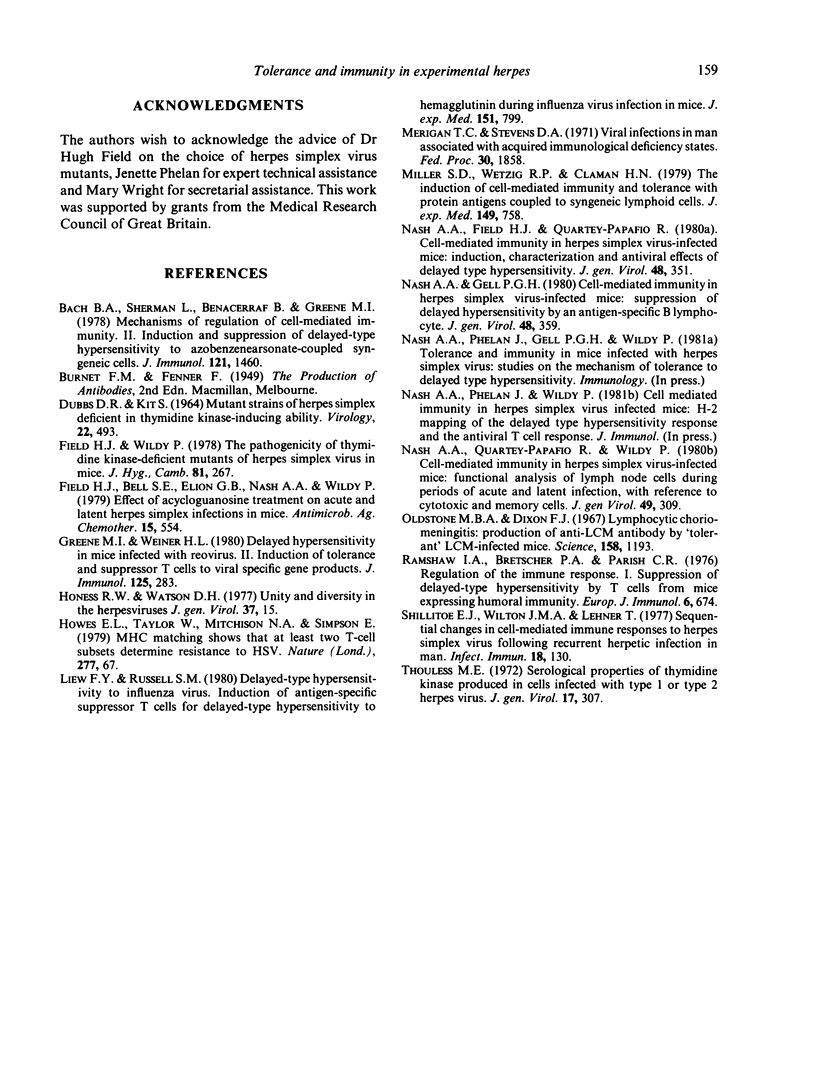
Selected References
These references are in PubMed. This may not be the complete list of references from this article.
- Bach B. A., Sherman L., Benacerraf B., Greene M. I. Mechanisms of regulation of cell-mediated immunity. II. Induction and suppression of delayed-type hypersensitivity to azobenzenearsonate-coupled syngeneic cells. J Immunol. 1978 Oct;121(4):1460–1468. [PubMed] [Google Scholar]
- DUBBS D. R., KIT S. MUTANT STRAINS OF HERPES SIMPLEX DEFICIENT IN THYMIDINE KINASE-INDUCING ACTIVITY. Virology. 1964 Apr;22:493–502. doi: 10.1016/0042-6822(64)90070-4. [DOI] [PubMed] [Google Scholar]
- Field H. J., Bell S. E., Elion G. B., Nash A. A., Wildy P. Effect of acycloguanosine treatment of acute and latent herpes simplex infections in mice. Antimicrob Agents Chemother. 1979 Apr;15(4):554–561. doi: 10.1128/aac.15.4.554. [DOI] [PMC free article] [PubMed] [Google Scholar]
- Field H. J., Wildy P. The pathogenicity of thymidine kinase-deficient mutants of herpes simplex virus in mice. J Hyg (Lond) 1978 Oct;81(2):267–277. doi: 10.1017/s0022172400025109. [DOI] [PMC free article] [PubMed] [Google Scholar]
- Greene M. I., Weiner H. L. Delayed hypersensitivity in mice infected with reovirus. II. Induction of tolerance and suppressor T cells to viral specific gene products. J Immunol. 1980 Jul;125(1):283–287. [PubMed] [Google Scholar]
- Honess R. W., Watson D. H. Unity and diversity in the herpesviruses. J Gen Virol. 1977 Oct;37(1):15–37. doi: 10.1099/0022-1317-37-1-15. [DOI] [PubMed] [Google Scholar]
- Liew F. Y., Russell S. M. Delayed-type hypersensitivity to influenza virus. Induction of antigen-specific suppressor T cells for delayed-type hypersensitivity to hemagglutinin during influenza virus infection in mice. J Exp Med. 1980 Apr 1;151(4):799–814. doi: 10.1084/jem.151.4.799. [DOI] [PMC free article] [PubMed] [Google Scholar]
- Merigan T. C., Stevens D. A. Viral infections in man associated with acquired immunological deficiency states. Fed Proc. 1971 Nov-Dec;30(6):1858–1864. [PubMed] [Google Scholar]
- Miller S. D., Wetzig R. P., Claman H. N. The induction of cell-mediated immunity and tolerance with protein antigens coupled to syngeneic lymphoid cells. J Exp Med. 1979 Mar 1;149(3):758–773. doi: 10.1084/jem.149.3.758. [DOI] [PMC free article] [PubMed] [Google Scholar]
- Nash A. A., Field H. J., Quartey-Papafio R. Cell-mediated immunity in herpes simplex virus-infected mice: induction, characterization and antiviral effects of delayed type hypersensitivity. J Gen Virol. 1980 Jun;48(Pt 2):351–357. doi: 10.1099/0022-1317-48-2-351. [DOI] [PubMed] [Google Scholar]
- Nash A. A., Gell P. G. Cell-mediated immunity in herpes simplex virus-infected mice: suppression of delayed hypersensitivity by an antigen-specific B lymphocyte. J Gen Virol. 1980 Jun;48(Pt 2):359–364. doi: 10.1099/0022-1317-48-2-359. [DOI] [PubMed] [Google Scholar]
- Nash A. A., Quartey-Papafio R., Wildy P. Cell-mediated immunity in herpes simplex virus-infected mice: functional analysis of lymph node cells during periods of acute and latent infection, with reference to cytotoxic and memory cells. J Gen Virol. 1980 Aug;49(2):309–317. doi: 10.1099/0022-1317-49-2-309. [DOI] [PubMed] [Google Scholar]
- Oldstone M. B., Dixon F. J. Lymphocytic choriomeningitis: production of antibody by "tolerant" infected mice. Science. 1967 Dec 1;158(3805):1193–1195. doi: 10.1126/science.158.3805.1193. [DOI] [PubMed] [Google Scholar]
- Ramshaw I. A., Bretscher P. A., Parish C. R. Regulation of the immune response. I. Suppression of delayed-type hypersensitivity by T cells from mice expressing humoral immunity. Eur J Immunol. 1976 Oct;6(10):674–679. doi: 10.1002/eji.1830061003. [DOI] [PubMed] [Google Scholar]
- Shillitoe E. J., Wilton J. M., Lehner T. Sequential changes in cell-mediated immune responses to herpes simplex virus after recurrent herpetic infection in humans. Infect Immun. 1977 Oct;18(1):130–137. doi: 10.1128/iai.18.1.130-137.1977. [DOI] [PMC free article] [PubMed] [Google Scholar]
- Thouless M. E. Serological properties of thymidine kinase produced in cells infected with type 1 or type 2 herpes virus. J Gen Virol. 1972 Dec;17(3):307–315. doi: 10.1099/0022-1317-17-3-307. [DOI] [PubMed] [Google Scholar]


